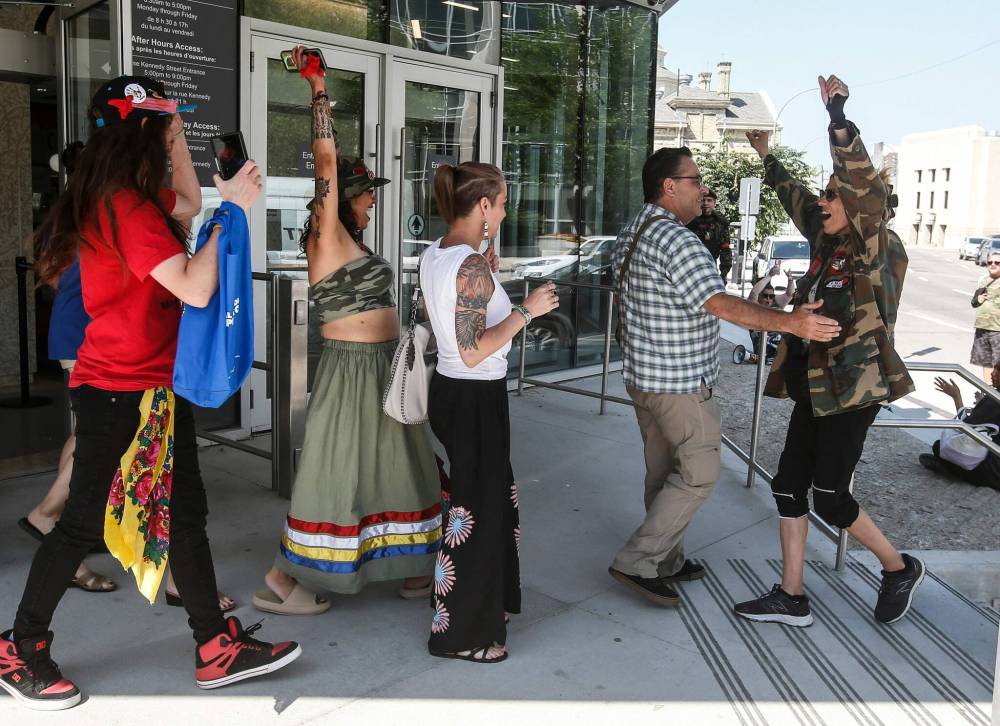I was told by a retired judge that if a courtroom is packed with more security than usual, the presiding judge is going to deliver unexpected news.
On Thursday morning, during the verdict in the quadruple murder trial of Jeremy Skibicki, there were seven security officers, three of whom surrounded the accused, in the courtroom.
That’s precisely the amount there has been in the entire trial.

JOHN WOODS / THE CANADIAN PRESS
Families and supporters of four murdered women celebrate outside the Manitoba Law Courts after the guilty verdict of serial killer Jeremy Skibicki was delivered Thursday.
I’ve seen many murder cases of Indigenous people in Canada, often with tons of very one-sided evidence — but Manitoba has never seen one like the Skibicki trial.
Still, as the court waits for Chief Justice Glenn Joyal to deliver his ruling, I — and anyone who has watched Manitoba’s justice system consistently deliver injustice to Indigenous people — have doubts.
My suspicion rises as Joyal informs the court there will be no written judgment today. An over-150 page ruling will be issued next week.
The court, which includes family members, police officer and nearly 20 reporters from outlets that include the BBC, will have to wait. Today there will be “an oral delivery of the facts of the decision.”
I turn and count the security in the room. Still seven.
I wonder how different this trial will be.
Joyal then speaks for over half an hour.
He first overviews the Crown’s case that Skibicki willfully committed four murders, facts that “were largely uncontested as they were established by the accused’s own admission to police” and the murders followed “a general pattern” and was driven by “purely expressed racist views.”
He then recounts the traumatizing details of the murders and assaults of Morgan Harris, Marcedes Myran Rebecca Contois, and the unknown woman given the name Mashkode Bizhiki’ikwe, or Buffalo Woman.
Joyal himself called the facts “mercilessly graphic” and “jarring and numbing.”
As has been throughout this trial, every detail sparks a gasp, breath, or tear.
For some, the facts of the case are still new – particularly the horrendous ones surrounding necrophilia, dismemberment, and the discarding of human remains.
Media, in fact, only shared parts of the case the Crown had presented — an attempt to respect the families of the victims.
For those of us familiar with the rampant murders of Indigenous women, girls, and two-spirit people across Canada, it is an all-too familiar story.
Joyal then becomes business-like. He recounts the defence’s case and explains at length how the court “must consider” the argument that Skibicki was not criminally responsible due to a mental disorder.
Joyal states that a defence of “not criminally responsible” is a “legitimate defence a court must consider in a civil society.”
He says that despite the “high profile” of the case and “context of the crimes” this defence must be considered “impartially.”
I turn and look. Still, the same: seven.
I admit feeling very uncomfortable.
Then, Joyal’s tone shifts.
He condemns the defence’s presentation of evidence by Dr. Sohom Das, a forensic psychiatrist from the United Kingdom, who argued Skibicki “heard voices” related to schizophrenia.
Joyal calls Das “inexperienced” and questions his professionalism.
The Crown prosecution’s psychiatrist, Dr. Gary Chaimowitz, on the other hand, convinced Joyal that Skibicki “did not have a mental disorder,” constructed his delusions, and knew “what he was doing was wrong.”
Then, the chief justice of the Court of King’s Bench of Manitoba says words that are drowned out by applause, cheers, and cries of happiness.
“I find Jeremy Skibicki guilty on all four counts of first-degree murder.”
Outside the courthouse, cheers and honking cars meet the representatives of the Harris, Myran, and Contois families. Many announce their vindication.
Jordan Myran, sister of Marcedes Myran, tells media: “I’m extremely happy and I feel like a weight has been lifted off my shoulders. Justice was served today.”
Jeremy Contois, older brother of Rebecca Contois, says: “Hopefully, this decision brings closure.”
Melissa Robinson, cousin of Morgan Harris, announces it is a “damn good day to be Indigenous” stating: “Now we’re changing that outlook on the way people see our women. Our women are not garbage… our courts will not allow this.”
Every family member who spoke to media said the focus now turns the remains of Harris and Myran, who Winnipeg police believe are in the Prairie Green Landfill.
A $40-million search of the landfill, funded by the Manitoba and federal governments, is set to begin this fall.
Of course, questions remain. The failure of police to act swiftly to stop the crimes, the political refusal to search the Prairie Green Landfill, and the fact that the epidemic of murdered and missing Indigenous women, girls, and two-spirit people persist.
An independent inquiry into the Skibicki murders — something more than 400 chiefs at the Assembly of First Nations meetings called for in a resolution this week — might address some of these.
On Thursday, though, a little unexpected change happened.
A little.
niigaan.sinclair@freepress.mb.ca

Niigaan Sinclair
Columnist
Niigaan Sinclair is Anishinaabe and is a columnist at the Winnipeg Free Press.
Our newsroom depends on a growing audience of readers to power our journalism. If you are not a paid reader, please consider becoming a subscriber.
Our newsroom depends on its audience of readers to power our journalism. Thank you for your support.